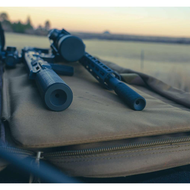Suppressor Laws by State: What You Need to Know
Sep 16th 2024
Suppressors, also known as silencers, have become increasingly popular among firearm enthusiasts for their ability to reduce noise, protect hearing, and improve shooting accuracy. However, their use and ownership are regulated by both federal and state laws. If you're considering purchasing a suppressor, it's crucial to understand the laws in your state to ensure compliance.
This guide provides a detailed overview of suppressor legality across the United States, breaking down which states allow ownership, which do not, and what regulations you need to follow.
Federal Laws Governing Suppressors
Suppressors are regulated under two primary federal laws:
- National Firearms Act (NFA):
- Enacted in 1934, the NFA classifies suppressors as Title II firearms, requiring additional regulations for ownership.
- Ownership requires an ATF Form 4 submission, a $200 tax stamp, and approval.
- Gun Control Act (GCA):
- Enacted in 1968, the GCA defines who can legally own suppressors and other firearms.
Federal Requirements for Suppressor Ownership:
To legally own a suppressor under federal law, you must:
- Be at least 21 years old to purchase from a dealer or 18 years old to possess via inheritance or private transfer.
- Be a U.S. citizen or permanent resident.
- Pass a background check by the ATF.
- Submit ATF Form 4 and pay the $200 tax stamp.
- Reside in a state where suppressor ownership is legal.
Suppressor Legal States
Suppressor ownership is legal in 42 states. Here's a breakdown of what you need to know for each:
States Where Suppressors Are Legal:
Suppressors are allowed for civilian ownership in the following states, but local laws may impose additional regulations:
- Alabama
- Alaska
- Arizona
- Arkansas
- Colorado
- Florida
- Georgia
- Idaho
- Indiana
- Iowa
- Kansas
- Kentucky
- Louisiana
- Maine
- Maryland
- Michigan
- Minnesota
- Mississippi
- Missouri
- Montana
- Nebraska
- Nevada
- New Hampshire
- New Mexico
- North Carolina
- North Dakota
- Ohio
- Oklahoma
- Oregon
- Pennsylvania
- South Carolina
- South Dakota
- Tennessee
- Texas
- Utah
- Vermont
- Virginia
- Washington
- West Virginia
- Wisconsin
- Wyoming
Hunting with Suppressors:
Many of the states where suppressors are legal also allow their use for hunting. These regulations vary, so be sure to confirm hunting laws in your state.
States Where Suppressors Are Illegal
Suppressor ownership is prohibited in the following states:
- California
- Delaware
- Hawaii
- Illinois
- Massachusetts
- New Jersey
- New York
- Rhode Island
Residents in these states are prohibited from owning suppressors under any circumstances. However, federal laws still apply if you are in the military or a law enforcement officer with appropriate authorization.
Key State-Specific Laws and Regulations
Even in states where suppressors are legal, specific regulations may apply. Here's what to keep in mind:
Texas
- Suppressors are explicitly legal for hunting all game and non-game animals.
- Texas passed a law allowing suppressors made and used entirely within the state to bypass federal regulations, though this is contested federally.
Washington
- While suppressors are legal for ownership, their use is restricted to certain scenarios.
Florida
- Suppressors are legal, and their use is permitted for hunting.
Transporting Suppressors Across State Lines
Federal law does not require additional paperwork for transporting suppressors across state lines as long as suppressor ownership is legal in both states. However, always verify state and local laws before traveling.
Steps to Stay Compliant
To ensure compliance with suppressor laws:
- Verify state legality and any specific restrictions in your area.
- Complete the required federal paperwork (e.g., ATF Form 4).
- Follow proper storage and usage regulations, including avoiding situations that could be interpreted as “constructive possession.”
FAQs: Suppressor Laws by State
1. Can I own a suppressor if I move to a state where they’re illegal?
No, you must comply with the laws of the state where you reside. If suppressors are illegal in your new state, you’ll need to transfer it to someone in a state where ownership is allowed.
2. Do I need special paperwork to travel with my suppressor?
No, as long as suppressor ownership is legal in both your origin and destination states, no additional paperwork is required. However, always verify state and local laws.
3. Are there any restrictions on using a suppressor in a legal state?
Yes, restrictions may include hunting laws or limitations on where and how suppressors can be used. Check state regulations for specifics.
4. Can I lend my suppressor to a friend or family member?
Under federal law, suppressors can only be possessed by the individual or trust listed on the ATF Form 4. Lending it to someone else, even temporarily, is illegal.
Conclusion
Understanding suppressor laws by state is essential for staying compliant and making informed purchasing decisions. While suppressors are legal in most states, the nuances of state-specific and federal regulations can be complex. By following the guidelines in this article, you can ensure your suppressor ownership and use remain fully compliant.
For more information or to start your suppressor purchase process, check out our full lineup of suppressors.

